Accius in Leiden
How did the work done, sometimes in extraordinary circumstances, by a few seventeenth-century Dutch scholars connected with Leiden University contribute to shaping the way in which we experience the fragments of the Roman poet Accius today? That is a story I propose to investigate in this blog post.
Recently I have been busy working on the Roman poet Accius, a poet and scholar who was active in the second and first centuries BCE. He is best known for writing tragedies, which unfortunately survive only in fragments quoted by later authors. I have been focusing on two of these tragedies in particular, the Aegisthus and the Clytemnestra. The purpose of this blog post is to show how the work of scholars based in Leiden several centuries ago has influenced the way we read some of the fragments of Accius today. Consider the following two fragments, quoted as they appear in Jacqueline Dangel’s 1995 edition, which remains the most recent:
A rough translation of the first fragment is: ‘they are suffering long-delayed blows’. But everything about it is uncertain: the identity of the speaker, that of the victims of this apparently violent murder, the dramatic context, and even the Latin text itself. In fact, if we look at the manuscripts of the fourth-century grammarian Donatus, who preserves the fragment for us by quoting it in a passage of his commentary on Terence’s play The Brothers, the text of the fragment is different. In the manuscript of Donatus held in Leiden University Library (shelfmark VLQ 24, f. 156v), we find the following:
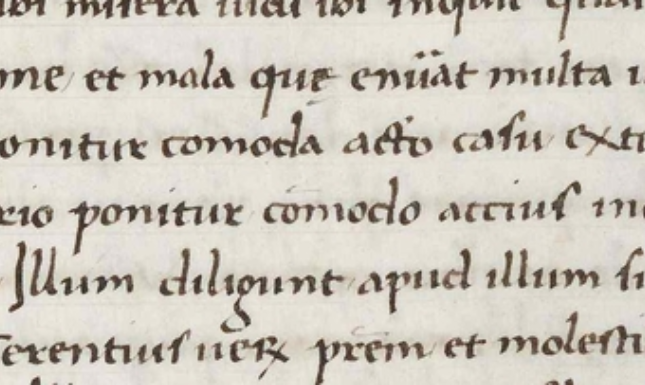

‘Feras potiuntur plagas’: the final word of the third line in the passage pictured above is clearly feras, and all the other extant manuscripts have the same reading, with the sole exception of the codex Chigianus (also known as manuscript K) which was discovered only in 1906 by Minton Warren and was therefore unavailable to earlier editors. If feras potiuntur plagas were to be read, then the fragment would translate roughly as: ‘they are suffering savage blows’, which both makes sense and has excellent manuscript authority. Why, then, do modern editors print seras and not feras?
The answer is to be found in a book stored away in the closed stacks of Leiden University Library. This book (shelfmark 759 C 16) is a copy of Lindenbrog’s 1623 Frankfurt edition of Donatus’ commentary on Terence which belonged to Johann Friedrich Gronovius (1611-1671), who held the chair of Greek in Leiden from 1658 until his death. Gronovius had access to some variant readings contained in a manuscript of Donatus’ commentary on Terence, known as the codex Cuiacianus because it belonged to the French jurist Jacques Cujas. Although this manuscript unfortunately is now lost, it was a descendant of another lost, but very important, manuscript known as the codex Carnotensis because it was discovered at Chartres. The codex Carnotensis (or Γ) was one of the two known hyparchetypes of Donatus’ commentary and its text was better than any of the surviving witnesses. In the margins of his copy of Lindenbrog’s edition, Gronovius wrote down the readings of the codex Cuiacianus whenever they seemed to him to be better than the text that was printed in Lindebrog’s edition (interestingly, Lindenbrog too had access to the readings of the codex Cuiacianus: see Reeve, 1979, 324-6). One such occasion is the passage of Donatus under discussion here: the text printed in Lindenbrog’s edition is feras potiuntur plagas, but, in the margin, Gronovius has written siras:
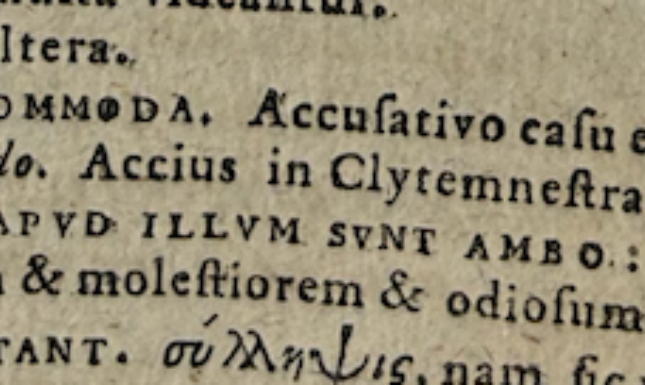

Now, siras itself does not make sense, nor does syras, the reading of the K manuscript mentioned above. If we assume, however, that an e was originally written instead of the i of siras and the y of syras, then we have the reading seras, the accusative feminine plural of the adjective serus ‘late’. ‘They are suffering long-delayed blows’ makes for a more appealing text than the comparatively colourless ‘they are suffering savage blows’. We might, for example, imagine the speaker savouring the sweet fulfilment of a long-awaited revenge, or bitterly lamenting the cruel but inevitable fulfilment of divine punishment.
On now to our second fragment, quoted above. An approximative translation is: ‘You criticize your mother for a lawful deed but approve of your unlawful father’. When it comes to the identity of the speaker and the dramatic context of this fragment, we are on slightly firmer ground. The consensus among scholars is that this is Clytemnestra arguing with her daughter Electra about the murder of Electra’s father, Agamemnon, by none other than her mother, Clytemnestra. When it comes to the Latin text, however, what is quoted above is, again, not what appears in the manuscripts. Below is the text of the Leiden manuscript of Nonius which once belonged to the illustrious Leiden-born Classical scholar Isaac Vossius (Isaac Vos, 1618-1689), to whom Leiden owes its world-famous collection of manuscripts, the Codices Vossiani Latini (shelfmark VLF 73, f. 70v):
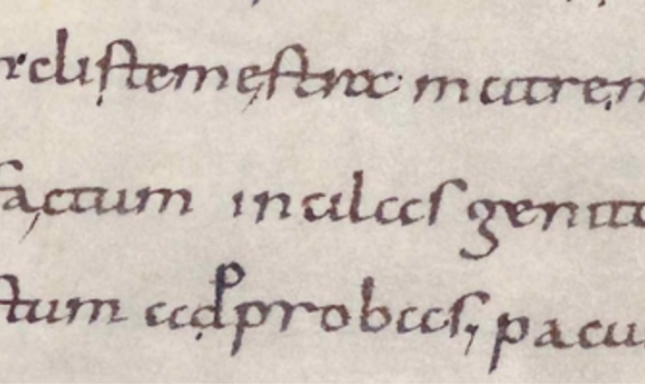

The text of this manuscript, as well as that of all the other manuscripts of Nonius (or at least those that scholars have checked: there are, by Guido Milanese’s reckoning, 144 in total), is matre meo iure factum incilas genitorem iniustum adprobas. The paradosis, or the text as it has been transmitted in the manuscripts, cannot stand, simply because it makes no sense. Matre meo iure looks like a clause in the ablative absolute, but it is ungrammatical. Meo cannot agree with matre because it is a masculine pronoun: it must therefore go with iure (‘within my rights?’), but then how to construe matre? We owe the text of the fragment as it appears in Dangel, as well as in other modern editions, to a brilliant conjecture by Hugo Grotius (Hugo de Groot, 1583-1645), who will probably be familiar to most people not as a Classical scholar, but as a lawyer and diplomat. Grotius proposed that matre meo is a corruption of matrem ob: adopting this conjecture, the text, translated literally, means ‘you criticize your mother (matrem) on account of (ob + accusative) something she did (factum) according to the law (iure) ...’.
If we dig a little into the background of this conjecture, a fascinating picture emerges. Grotius’ conjecture first appeared in an edition of the fragments of Roman Republican tragedy (Collectanea ueterum tragicorum fragmenta) published around October 1620 by his friends Petrus Scriverius (Pieter Schrijver, 1576-1660) and Gerardus Ioannes Vossius (Gerrit Jansz Vos, 1577-1649). Vossius credits Grotius with the conjecture in his notes on the text (Vol. 2, p. 145), but the name of Grotius is nowhere to be seen in the prefatory material at the beginning of the edition, whereas other scholars, notably Daniel Heinsius and Johannes Meursius (van Meurs), are mentioned despite contributing no conjectures. The absence of Grotius’ name is presumably related to the fact that, in 1620, Grotius was in prison. He had been in prison since his arrest in 1618 on account of his role in the fierce conflict within Protestantism between the Remonstrants, who followed the controversial ideas of Jacobus Arminius (professor of theology in Leiden from 1603), and the Counter-Remonstrants, who adhered strictly to Calvinism. Grotius lent his support to the former group and had been viewed with suspicion by the Counter-Remonstrants since the publication in 1613 of a fierce pamphlet, Ordinum pietas, in which he defended Remonstrant doctrine. The situation became increasingly hostile until, on 29 August 1618, influential members of a faction of the Remonstrants were arrested in The Hague, and among them was Grotius (see Nellen, 2007, chs. 6-8). In the midst of this tense climate, it would have been too dangerous, in 1620, for Vossius to mention his friend by name in such a conspicuous part of the edition as the preface: Grotius’ friend and ally Johan van Oldenbarnevelt had been publicly executed on 11 May 1619. And Vossius himself was not in the easiest of situations following his dismissal in July 1619 from the position of regent of the Collegium Theologicum at the University of Leiden.
It is therefore clear that Grotius made this important emendation to the text of Accius, as well as several others, during his time in a prison cell in Loevestein Castle near Zaltbommel in Gelderland. Judging from his correspondence dating from this period, Grotius gives the impression of a downcast and isolated man. He writes to his brother Willem, in a letter dated to 1 November 1620, that he has not yet received from Vossius the edition of the fragments containing his emendations that had been published a month or so earlier. Clearly eager to receive the edition, Grotius writes that he intends to study it carefully, in spite, he says, of having suffered a complete lapse in his critical acumen (quamquam defectus omni critica supellectile; Briefwisseling van Hugo Grotius, Letter 607, p. II.36 Molhuysen). But Grotius is clearly adopting a stance of false modesty because, less than two months later, he sends to Vossius some further conjectures on the text of the Latin tragic fragments (Letter 608, p. II.37 Molhuysen).
Among this second series of conjectures is an emendation to the text of another fragment of Accius’ Clytemnestra, v. 301 Dangel. Fortunately, this conjecture has been preserved thanks to Petrus Burmannus (Pieter Burmann, 1668-1741). Doubtless thanks to his role as librarian of Leiden University, Burmannus had access to Grotius’ own annotated copy of Scriverius’ and Vossius’ edition and he copied the marginal annotations Grotius had made in it into a new manuscript. This manuscript survives and is now held in Leiden University Library (shelfmark Per. Q 41:2, f. 20):
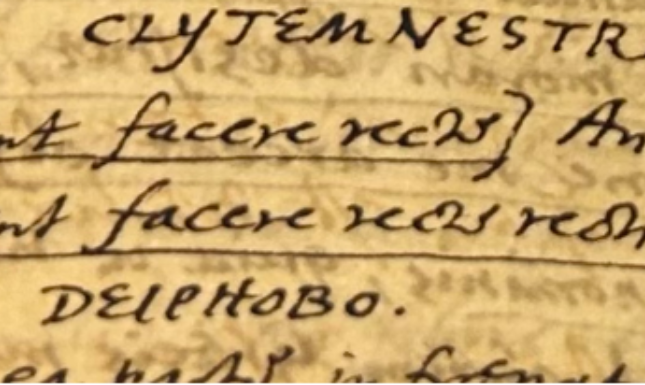

Grotius suggests that the text of what is now known as Accius Clytemnestra v. 301 Dangel, omnes gaudent facere recte; mali pigrent (‘all people rejoice in acting correctly: bad people are lazy to do so’), a fragment that has proved problematic for both interpretative and metrical reasons, should in fact read: omnes gaudent facere recte recti: nam mali pigrent (‘all righteous people rejoice in acting righteously: for indeed bad people are lazy to do so’). This conjecture solves the metrical problem by turning the fragment into a complete trochaic septenarius, and, while it has not been met with as much success as Grotius’ conjecture of matrem ob in v. 300 Dangel (see above) in so far as it is not printed in the text of the fragment by any later editors, it is still considered important enough to be recorded in their critical apparatuses.
Fewer than four months later, on 22 March 1621, Grotius would make an extraordinary escape from Loevestein Castle by hiding in a bookcase. Grotius is of course famous for his lasting impact in the field of maritime law, but his name will also live long in the memory among the narrower community of students of Accius. Indeed the work of several important Dutch scholars of the seventeenth century, which is made accessible to us thanks to Leiden University Library and the wonderful staff of its Special Collections department, has shaped the way we read and experience Accius today.
References
Nellen, H. Hugo Grotius: A Lifelong Struggle for Peace in Church and State. 1583-1645. Translated by J.C. Grayson. Leiden: Brill, 2007.
Reeve, M. ‘The Textual Tradition of Donatus’ Commentary on Terence’. Classical Philology 74 (1979): 310-326.


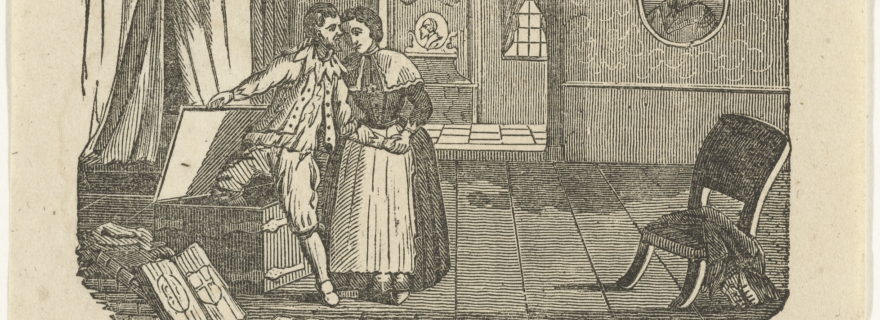
0 Comments